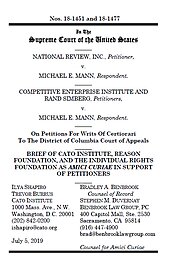Learn more about Cato’s Amicus Briefs Program.
Seven years ago, Rand Simberg, an adjunct scholar at the Competitive Enterprise Institute (CEI), wrote a blog post criticizing the work of Dr. Michael E. Mann, a climatologist at Penn State University and a noted global warming doomsayer. Mann helped create the famous “hockey stick graph,” which shows temperatures spiking in the 20th century, and he was implicated in the famous “Climategate” scandal, when hackers obtained emails from the Climate Research Unit at the University of East Anglia. One of those emails described “Mike’s nature trick,” referring to the splicing together of different temperature data to “hide the decline” in global temperatures. The emails created enough controversy that investigations into Mann’s work were launched by Penn State and the National Science Foundation, both of which cleared him of any wrongdoing.
Simberg wrote that many in the skeptic community regarded the Penn State investigation as a “whitewash” because “university circled the wagons and narrowed the focus of its own investigation to declare him ethical.” He then used unfortunate language to compare the investigation to the then-ongoing Jerry Sandusky scandal, writing that Mann could be said to be “Jerry Sandusky of climate science, except for instead of molesting children, he has molested and tortured data in the service of politicized science.” He raised the Sandusky comparison because Penn State’s investigation had concluded that “in order to avoid the consequences of bad publicity” the university’s top officials had “repeatedly concealed critical facts relating to Sandusky’s child abuse from authorities.” Simberg asked if the university could be expected to “do any less to hide academic and scientific misconduct, with so much at stake” in terms of reputation and funding.
Michael Mann sued CEI, Simberg, National Review, and Mark Steyn for defamation (Mark Steyn had linked and quoted Simberg’s post in a National Review post), claiming that the accusations of scientific misconduct and data manipulation and molestation were false statements of fact (rather than opinion) that defamed his reputation as a scientist. Surprisingly, the DC Court of Appeals, which is like the state supreme court for DC, allowed the case to go forward despite the clear and disturbing First Amendment implications. Now the case is on petition to the Supreme Court. Cato has filed for the fourth time in this case, now joined by the Individual Rights Foundation and the Reason Foundation, and we’ve asked the Court to stop this dangerous case from going forward.
Defamation is one of the categories of speech unprotected by the First Amendment, and it is very important that courts keep those categories narrow or a lot of protected speech could be censored or chilled. When speech is about an ongoing debate of significant public concern, as is the case here, courts should be wary of those who want to use defamation law to shut down public debate. Mann, who has described climate change “deniers” as “shills for the fossil fuel industry,” was exonerated by the investigations into his conduct, but Simberg disagreed. The DC Court of Appeals, however, put undue weight on the investigations into Mann and other climate researchers. In the court’s view, the investigations showed not only that the allegation of “scientific misconduct” was “capable of being proved true or false, but the evidence of record is that it actually has been proved to be false by four separate investigations.”
Questioning an investigation that purports to exonerate a controversial figure should not give rise to an actionable defamation claim. Calling O.J. Simpson a murderer is not defamation because he was acquitted by a jury. Saying that someone who was exonerated by the Warren Commission did in fact have role in the Kennedy assassination is not defamation either. If this case is allowed to stand if will be the law in the District of Columbia, the pulsing heart of our political discourse. Those who arrive at conclusions contrary to official reports or investigations will be too easily subject to possible defamation suits. The Supreme Court should take the case to ensure that people can’t use courts to shut down public debate.

This work is licensed under a Creative Commons Attribution-NonCommercial-ShareAlike 4.0 International License.
